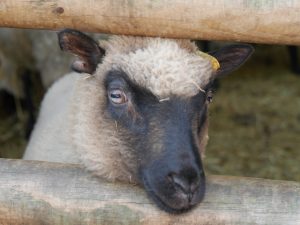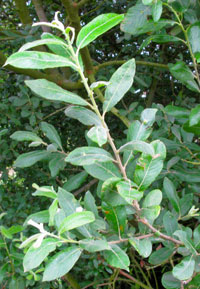Greenhouse Gases, Goats Willow and sheep.

Recent times have seen a recognition that livestock farming contributes to global warming. Ruminants such as cows, sheep and goats produce methane as a by-product of their digestion, not only that but their urine can release nitrous oxide - another potent greenhouse gas. It has been suggested that farming might account for some 10% of UK emissions.
However, some new research (published this January) conducted by Professor Chris Stoate (of The Game and Wildlife Conservation Trust) suggests that there might be a way of mitigating these emissions by changing the diet of certain ruminants slightly.His experiment involved the addition of goat willow leaves to the diet of one batch of sheep, and comparing the nitrous oxide production from their urine with that of a group that did not receive the leaves.
 Lower emissions of ammonia (and hence lower N2O) were found from the urine patches of the lambs fed with the goat willow leaves. Nitrous oxide (N2O) is a long-lived greenhouse gas and it also affects the ozone layer.
Lower emissions of ammonia (and hence lower N2O) were found from the urine patches of the lambs fed with the goat willow leaves. Nitrous oxide (N2O) is a long-lived greenhouse gas and it also affects the ozone layer.
Mixing agriculture with forestry may be a way forward as climate change continues - tree fodder being used as an alternative food source during periods of drought; a form of silvopasture where trees are combined with forage grassland and livestock production.
The Goat willow is a small willow tree often found in wet woodland, ditches and on waste land. It is a relatively fast growing pioneer species. It is a common willow, noted for its fluffy, silver-grey, male catkins - often referred to as 'pussy willows’. They appear in January and then turn yellow in March.
Comments are closed for this post.
Discussion
Sheep farming is ecologically unsustainable, both in terms of greenhouse gas emissions and habitat destruction. I am confused as to why Woodlands.co.uk feels the need to justify it or suggest that adding a supplement to their diets would solve all the problems with sheep farming.
Rose Perry
The UK has thousands of factory farms:
– egg laying hens are housed in huge sheds and fed an imported feed. Free range hens have slightly more space than battery hens, but it is basically the same. At the moment with Avian Flu, free range hens are kept indoors, but still allowed to use the ‘free range’ label.
– Same with meat chickens. Almost all poultry animals kept in sheds at high density and fed feed shipped in from elsewhere.
– Most pigs also kept in sheds and get a special mixed feed
– Dairy cattle kept in sheds while they are lactating and eat a special mixed feed
– Beef cattle kept in sheds over winter and eat a special mixed feed
– 90% of the UK 3 million tonnes a year of soya imports go towards the feed rations of animals kept in sheds.
Sheep are genuinely free range farmed animals, but they are not native to the UK and originate from the Middle East. Aside from the greenhouse gases they eat everything in sight and create upland deserts. The average sheep farmer gets 90% of their income from subsidies. Without subsidies there would be no sheep farming in the UK.
Historically, cows and other domesticated animals always had access to hedgerows, trees and wild herbs. These were an integral part of their diet. It is only modern farming methods which have given livestock the current highly impoverished monoculture of grass to eat. Therefore,it’s not surprising that their digestive systems have been upset.
I know that in the USA there are huge factory farms with thousands of animals kept in hideous conditions.
I am not aware that we have the same problem in the UK? If so,perhaps you can tell me where these factory farms are?
Sadly, this article is behind the curve – it is currently recognised that regenerative farming using grazing animals contributes enormously to soil regeneration and carbon sequestration – they are part of the solution not the problem.
The excellent work undertaken by Allan Savory and the Savory Institute is vital to the restoration of grasslands. His Ted talk is well worth watching – https://www.ted.com/talks/allan_savory_how_to_fight_desertification_and_reverse_climate_change
I think we can all agree that there are welfare and environmental concerns over intensive beef units where thousands of cattle are held in pens for extensive periods away from pasture to fatten them before slaughter and the supermarket shelves.

The blog does not seek to justify sheep farming.
It comments on the release of methane etc by ruminants and then adds there is also a problem with nitrous oxide. Indeed many of the blogs deal with the problems of greenhouse gas emissions e.g.https://www.woodlands.co.uk/blog/woodland-economics/a-problem-with-methane/
It then reports on / references some work that has been done that might to some degree mitigate some of the effects.
Reporting on different issues should not be construed as validating them.
blogs
13 April, 2021